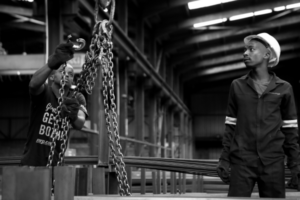Elina Nzumwa’s leadership journey is an inspiring example for all women in the labour movement as we celebrate Women’s Month in South Africa.
Tell us about yourself and your role in the union
I am the vice chairperson of the Women’s Desk at the Commercial Industrial Allied Workers Union (CIAWU). In the 1990s, I began my union journey while working in import and export. I was just a member, but my involvement grew over time, and I actively organised union members at various workplaces, even when I had to move between jobs. In 2006, I played a significant role in the union by organising a Game Store in Malawi and recruiting almost all the members while working as a floor manager.
How has your leadership evolved, and what are your plans for the future?
I have grown significantly as a leader, particularly in organising and mentoring other women. I draw inspiration from past leaders such as the late General Secretary of CIAWU, Mary Dzinyemba, who played a crucial role in shaping my leadership journey.
Comrade Mary was a remarkably strong leader and played a key role in strengthening the union. She inspired numerous women, including me, to pursue leadership roles at companies. Initially, I wasn’t sure I wanted to become a manager. I thought, “Maybe I don’t want this responsibility.” But Mary insisted, “No, you should be a manager. You can do this.” She provided tremendous support. There was even a time when I felt like quitting the union. I thought I didn’t want to be involved anymore. But Mary encouraged me to stay, saying, “You can’t stop now.” Her guidance and encouragement have shaped who I am today. She was a wonderful woman.
I am nearing retirement, and I want to train and empower more women leaders to continue this work. We need more women in leadership, not just in unions but also in workplaces. I reflected on my upcoming retirement and created a mentoring and solidarity WhatsApp group for women unionists. I encouraged them to choose a new group leader. We discuss our goals and the changes we want to see. The women have even made branded T-shirts, which they wear with pride, and such small gestures help bring unity and empowerment. Now they are confident to negotiate because they feel stronger and more united.
Which achievement are you most proud of?
One of our significant achievements has been the improvement of parental rights for CIAWU members. We have successfully extended maternity leave from three to four months, a victory for our union. Previously, women had to return to work when their babies were just two months old, often using their annual leave to extend their time at home. We have also secured one month of paternity leave for non-birthing parents, which is crucial for enabling fathers to participate in childcare.
What is CIAWU's bargaining strategy for maternity and paternity rights?
Our journey with negotiating maternity leave at Game Stores has been gradual. The original collective bargaining agreement offered one month, but we worked to increase it to two, three and eventually four months in 2023.
The process involved a lot of research and discussions, both within and outside of CIAWU. We got information – benchmarks from other companies and unions to build our bargaining case. For instance, we cited maternity and paternity policies in South African multinational companies operating in Malawi, such as Shoprite and Standard Bank, and existing collective agreements. We leveraged the knowledge and experiences of union leaders, the UNI Global Shop Stewards Alliance, and Labour Research Service. We have access to company information. We know how to speak to HR departments and negotiate with bosses. We also drew inspiration from colleagues from other countries with better maternity leave provisions. All these helped us present a strong and fact-based argument in negotiations with the management of Game Stores.
We need to keep pushing for improved parental rights for the well-being of parents and children. Adequate maternity leave allows mothers to bond with their newborns and recover fully before returning to work. Similarly, fathers need to be involved in childcare. It’s not just about support for mothers; it’s about fathers having the opportunity to bond with their children and sharing care responsibilities.
What is your message to women in the world of work?
Don’t give up the fight for your rights. Stay informed, be confident, and work together. Solidarity, support, and persistence enable us to achieve the changes we want.
RELATED ARTICLES
“All parents of whatever stripe”: LRS as amicus curiae in a landmark equal parental leave rights case
How to approach the equity bargaining process







